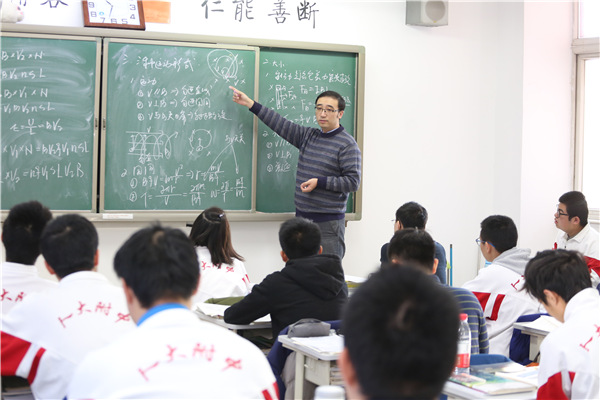Equating science with fun


In 2015, he launched a public WeChat account called Toilet Classroom, through which he hoped that students would be able to fill their fragmented time by studying. He posted short video clips, lasting five to 10 minutes, on physics and math. Most clips were recorded in Li's classroom after school.
The Diplomat, a magazine from the United States, referred to Li's vision for the Toilet Classroom as creating the Chinese version of the Khan Academy, the online learning platform famous for its free, high-quality lessons.
It was 2017 when a video, recorded and published by his students of him explaining the term "leap year", took the internet by storm with tens of millions of views in one day, propelling him to online stardom.
In the video, Li introduces the method to determine whether a year is a leap year and how to calculate leap years. His sudden renown made him realize just how much the public needed science education and outreach.
Standing in front of a chalkboard and facing a camera mounted on a tripod, Li often starts his video with a relatable life story, or by addressing a trending topic, to explain a common phenomenon in math or physics theory.
For instance, when last year's "chair challenge"-where people attempt to stand up while holding a chair close to their body in a task that seems simple for women, but impossible for men-appeared on worldwide social media, a six-minute video of Li explaining the theory behind the trick became an online hit.
Staying centered is key
The challenge calls for the participant to "put your toes to the wall, take one step back, another step back, feet together, put your head to the wall, grab the chair or stool, bring it to your chest, and stand up".
In Li's clip, he and a friend try it themselves, before he uses his chalkboard to show why it's easier for women than it is for men to stand up with the chair, by illustrating the physics of the supporting force, gravity, and the participant's center of gravity.
It turns out that it's all to do with men's larger feet, Li says. So behind the phenomenon, foot size matters.
It has been viewed about 2.6 million times on the video app.
"Because people are interested in topics related to their daily life, as a science content creator, I need to make the connection between life and science," Li says.
Getting huge hits on his videos, Li has become a bona fide internet celebrity, but he has also been widely reported on in traditional media, including China Central Television and People's Daily.
His rise to fame has also brought criticism. Some parents of his students questioned whether or not he was fully engaged with his teacher's job at the school, while some viewers think that some of his videos are not serious enough.
The value of Li's lessons and teaching methods have also been questioned, becoming a topic on Zhihu, a Chinese Q&A forum equivalent to Quora.
Li says that science outreach aims to spread the knowledge in a simplified manner and sometimes that means helping the audience understand in a relatable, not too rigorous, way.
"There are too many voices online. At first, I got angry, but now, as a public figure, I am learning not to take judgment and criticism personally," Li says.
As well as criticism, his fame has also brought a growing number of requests to attend events and all of the responsibility that brings.
For him, it is like returning to his first challenging years as a new teacher. He has been diagnosed with carotid artery disease. He has difficulty falling asleep at night.
However, he notes: "With so many people expecting to view my work, I just cannot stop."




































